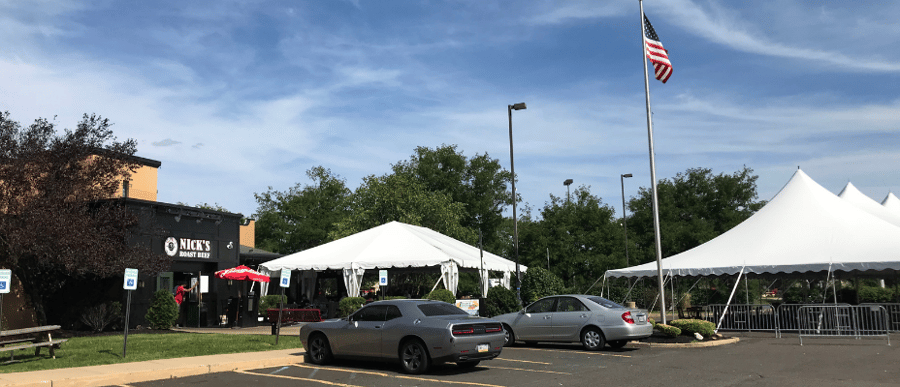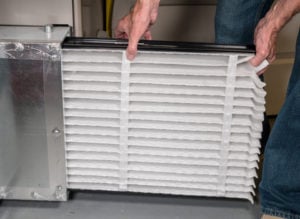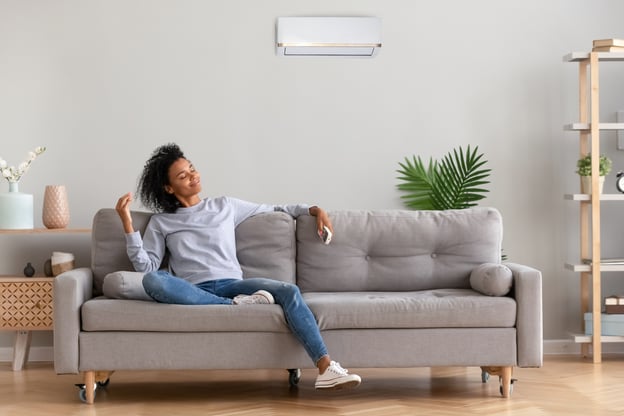.webp?width=200&height=75&name=blue-ridge-heating-air%20(1).webp)






As an HVAC contractor, your business is pivotal to keeping people healthy and to keeping other businesses going, especially as the weather turns cooler this Fall and activities begin to move inside.
How can you help, and maybe even grow your business during this time? Let’s start with some facts.
As we all know, when it starts to get cooler outside, people spend more time indoors.
Overall humidity tends to decrease.
Even when there’s not a pandemic, more people inside, plus recirculating air, plus reduced humidity is a recipe to spread colds and flu.
There have been a number of studies from the Centers for Disease Control (CDC) that state COVID-19 is spread by aerosol transmission, and can remain infectious, suspended in the air for up to 16 hours. This information has a significant impact on the ability to spread the virus in any place where public gatherings occur-businesses, office buildings, schools, and more.
The WHO also reports that if the air conditioning or ventilation system are not well maintained and operated, there are two potential mechanisms where they can contribute to virus transmission:
During mild weather, many business owners have been able to piece together temporary solutions to this crisis.

Restaurants have been setting up seating outdoors and even in parking lots. Business meetings are taking place outside. Even some schools are experimenting with having classes outdoors as weather allows.
The flow of fresh air can greatly reduce the concentration of virus, and thus the chances of infectivity.
However, as we head into October of 2020, these warm-weather measures are not viable in much of the United States and Canada.
Business owners need a variety of solutions.

Knowing that viruses and other pathogens can remain infectious in the air, and the risk of spread increases with re-circulation of air by poorly maintained and filtered HVAC systems, means that indoor air purification is going to be critical to keep infection rates down as people spend more time indoors.
That means that HVAC contractors have to understand the facts, and what they can recommend to residential and business customers to help them improve their indoor air quality and their own health in the process.
1. https://vascularnews.com/new-study-shows-covid-19-causes-blood-vessel-damage/
2. https://wwwnc.cdc.gov/eid/article/26/9/20-1806_article
The pandemic will not be here forever, and many of you were already firm believers in the benefits of improved indoor air quality, so this is not a difficult transition.
You have ALWAYS believed these products would improve your customers' lives. Especially customers with family members suffering from asthma or acute allergies.
Whether at home or work, better air quality decreases allergies and illness. Period. There are plenty of data to support this claim.
Given the short-term and long-term health benefits to improving indoor air quality and reducing sick time, investing in IAQ systems is in everyone’s best interest, whether it’s for your family, workers, or customers, or in residential homes or main street businesses.
Everyone is going to want to be extra-vigilant about air quality this winter.
Just to drill the point home, the World Health Organization (WHO) has issued international recommendations and guidelines about HVAC systems and maintenance. They include:
4. http://www.ghhin.org/heat-and-covid-19/ac-and-ventilation
5. http://www.ghhin.org/heat-and-covid-19/ac-and-ventilation

COMMERCIAL
High-occupancy publicly-accessed commercial properties such as stores, hotels, schools, shopping malls, restaurants, office buildings, etc. generally operate on centralized and ‘closed-system’ climate control and ventilation systems.
RESIDENTIAL
Homes throughout the country have come to rely on central air systems, and with increased efforts for energy efficiency, many homes have reduced their “envelope”- which means less fresh air and more recirculated air.
That means there will be a need to
For example, adding air purification systems like AprilAire’s humidity and UV-C air purification systems could help increase IAQ and reduce viral spread in both residential and commercial environments.
There are even new products like IQAir’s AirVisualizer Pro that can help people monitor indoor air quality and this is especially important in areas that have been plagued with fire and outdoor air quality issues, such as California. Click here to see the areas of the country with the worst air quality scores.
The first task at hand is to educate current and potential customers about what they need to know to stay healthy.
As an HVAC contractor, you should take this opportunity to educate both residential and commercial customers about the following:
Building and business owners and facility managers should be advised about the safety measures they can take to ensure air conditioning and industrial ventilation systems are inspected, maintained, and regularly cleaned to reduce inadvertent transmission risk.
Set temperatures between 75°F and 80.5°F during the warmer weather, and RH between 40% and 60% to reduce mold growth (CDC 2015).
 In non-hospital buildings where ventilation systems function in a closed circuit, (such as in office buildings, restaurants, hotels, shopping malls, senior housing facilities, and schools), a high-efficiency particulate air (HEPA) filtration (or the highest MERV rating allowed by the HVAC system) should be used to clean recirculated air.
In non-hospital buildings where ventilation systems function in a closed circuit, (such as in office buildings, restaurants, hotels, shopping malls, senior housing facilities, and schools), a high-efficiency particulate air (HEPA) filtration (or the highest MERV rating allowed by the HVAC system) should be used to clean recirculated air.
Another strategy would be to install distributed HVAC (heating ventilation and air conditioning) units such as packaged terminal air conditioners (PTAC) that do not depend on a central mechanism to distribute and recirculate air (Dietz et al. 2020).
If they use an air purifier, you must also ensure proper maintenance by following manufacturer recommendations.
If fans are used, they should be installed where room air can be exhausted directly to the outdoor environment through either a window or door (WHO 2009).
The use of fans is advised where there is only one person in a room. In collective spaces, when several people are present in this space, the use of fans for air circulation/cooling is not advised particularly in small volume, closed or partially open spaces with minimal outside air exchange (HCSP, 2020).
If fans are used, take steps to minimize air from fans blowing from one person directly at another to reduce the potential spread of any airborne or aerosolized viruses (CDC-2020).
As an HVAC contractor, you have the knowledge to help residential and commercial customers better understand the benefits of maintaining their HVAC systems, enhance filtration and purification, and in the process, greatly reduce the spread of COVID 19 and other illnesses, now and into the future.
This is an opportunity to help your community and benefit by providing the services they need most at this time.
It’s rare that a crisis poses this kind of opportunity, but if you take the right helpful and educational tone while offering solutions to this being problem, your business could benefit during this time when so many businesses are stressed. You have the solution that can help their businesses continue to be viable. In the end, let’s face it.
The health of all of us depends on it.

About the Whitney Hoffman:
.webp?width=200&height=75&name=blue-ridge-heating-air%20(1).webp)





